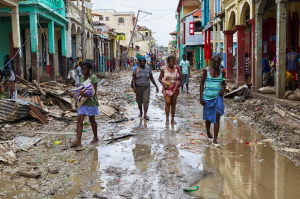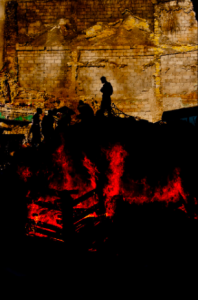By Staff Writer Dallin Durtschi written in conjunction with Adrienne Sternlicht*
Human rights activists have long been critical of the lack of media attention to the plight of the refugees across the globe. Yet, the image of U.S. immigration officers on horseback attempting to lasso Haitian asylum seekers in October 2021 drew unprecedented attention to the issue in our backyard. There was so much public scrutiny that the Biden administration was seemingly at a loss of words, and U.S. Special Envoy to Haiti Daniel Foote immediately resigned. If ever there were an auspicious moment to challenge the status quo treatment of refugees in the U.S. and the unreasonably narrow protections afforded to asylum seekers, the time is now.
In order to adapt to the changing global landscape and the needs of those fleeing persecution, climate change and threats to life, the U.S. must make room for asylum seekers whether that persecution is based on a certain nationality, race, or identity or not.

Current U.S. asylum laws are obsolete. According to the Refugee Act of 1980, those who arrive at the U.S. border can seek asylum if they are able to demonstrate a “credible or reasonable” fear of persecution due to their race, religion, nationality, or membership in a particular social or political group. This framework is based on a historical commitment by the U.S. government to those escaping persecution during the Holocaust. These individuals were persecuted according to their race, religion, nationality, or membership in particular groups.
Yet, today many lives are at stake or under threat of persecution for reasons that do not fall within the categories delineated above. These threats are equally as pernicious yet are perpetrated by non-state actors in the form of gangs, tribal groups, warlords, or terrorists. Haiti is one such place where non-state actors present a credible threat to its citizens irrespective of the individual’s identity.
Haiti is in a state of constitutional crisis. Since the brutal slaying of President Jovenel Moise in early July 2021, the country has suffered from extreme political instability and a devastating natural disaster killing over 2,000 people. The fragility of the Haitian government is nothing new, and has only been perpetuated by U.S. aid that bolsters corrupt politicians in the name of short term stability. Yet, the escalation in gang violence following Moise’s death poses a heightened threat to the future security of the nation. Rival gangs continue to battle for territor

ial control, taking over large swaths of major cities like Port-au-Prince. In the past few months, over 19,000 Haitians have been uprooted on account of this gang violence, indicating a more than four-fold increase in violence-related displacement according to a recent United Nations report.
The mere fact that the U.S. could so readily deport Haitian migrants fleeing genuine persecution illuminates a gaping hole in our nation’s human rights apparatus and its ability to protect the most vulnerable individuals. Although some Haitian asylum seekers may be able to demonstrate that the persecution they face is based on political or social affiliation, thousands cannot make their case given the scope of current protections. Yet, the enduring chaos in Haiti means these individuals who attempted to flee will return to an environment where gangs and political instability effectively threaten their lives. It is quite possible that the rejection of asylum by the U.S. for these Haitians will equate to a death sentence.
The question of whether the U.S. should have accepted Haitian asylum seekers is a subject of not only ethical but also legal debate. Even if it seems much of the U.S. public stood in agreement of accepting these vulnerable individuals escaping real and immediate danger, the current asylum laws extend no legal recourse due to a lack of obligatory protections. If the U.S. is legally mandated to grant asylum to a person at risk of being killed on account of their race, should this same obligation not be extended to an individual at risk of being murdered because of their proximity to lethal non-state actors? The U.S. had the opportunity to minimize the ensuing crisis and potentially save lives by granting these Haitians asylum. Unfortunately, outdated laws provide at-risk Haitians with no legal path to safety. Instead, they will return to a nation where they live under continuous threat at every turn. Let this be the last time the U.S. asylum process chooses to extend a death sentence instead of initiating a path towards safety. U.S. asylum law must be reviewed to protect future asylum seekers.
* Adrienne Sternlicht is a Master’s student at Columbia University’s Institute for the Study of Human rights.
Photos
Featured Image: “Haiti Hit by Hurricane Matthew” by United Nations Photo is licensed with CC BY-NC-ND 2.0. To view a copy of this license, visit https://creativecommons.org/licenses/by-nc-nd/2.0/
“zoriah_photojournalist_war_photographer_haiti_earthquake_port_au_prince_earth_quake_20100119_0542” by Zoriah is licensed with CC BY-NC 2.0. To view a copy of this license, visit https://creativecommons.org/licenses/by-nc/2.0/
